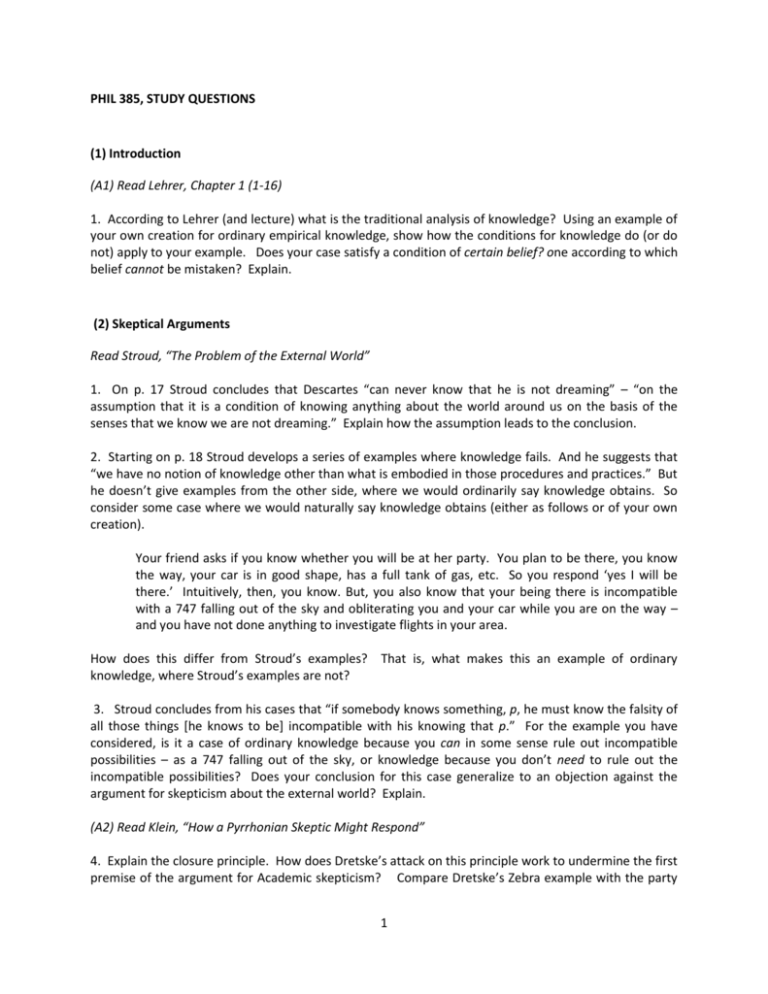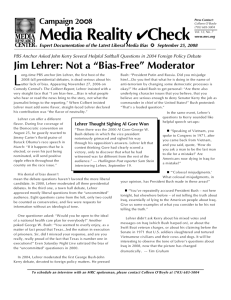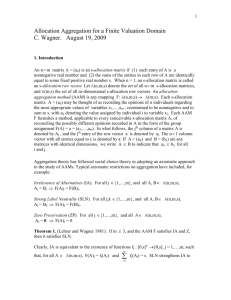phil 385, study questions
advertisement

PHIL 385, STUDY QUESTIONS (1) Introduction (A1) Read Lehrer, Chapter 1 (1-16) 1. According to Lehrer (and lecture) what is the traditional analysis of knowledge? Using an example of your own creation for ordinary empirical knowledge, show how the conditions for knowledge do (or do not) apply to your example. Does your case satisfy a condition of certain belief? one according to which belief cannot be mistaken? Explain. (2) Skeptical Arguments Read Stroud, “The Problem of the External World” 1. On p. 17 Stroud concludes that Descartes “can never know that he is not dreaming” – “on the assumption that it is a condition of knowing anything about the world around us on the basis of the senses that we know we are not dreaming.” Explain how the assumption leads to the conclusion. 2. Starting on p. 18 Stroud develops a series of examples where knowledge fails. And he suggests that “we have no notion of knowledge other than what is embodied in those procedures and practices.” But he doesn’t give examples from the other side, where we would ordinarily say knowledge obtains. So consider some case where we would naturally say knowledge obtains (either as follows or of your own creation). Your friend asks if you know whether you will be at her party. You plan to be there, you know the way, your car is in good shape, has a full tank of gas, etc. So you respond ‘yes I will be there.’ Intuitively, then, you know. But, you also know that your being there is incompatible with a 747 falling out of the sky and obliterating you and your car while you are on the way – and you have not done anything to investigate flights in your area. How does this differ from Stroud’s examples? That is, what makes this an example of ordinary knowledge, where Stroud’s examples are not? 3. Stroud concludes from his cases that “if somebody knows something, p, he must know the falsity of all those things [he knows to be] incompatible with his knowing that p.” For the example you have considered, is it a case of ordinary knowledge because you can in some sense rule out incompatible possibilities – as a 747 falling out of the sky, or knowledge because you don’t need to rule out the incompatible possibilities? Does your conclusion for this case generalize to an objection against the argument for skepticism about the external world? Explain. (A2) Read Klein, “How a Pyrrhonian Skeptic Might Respond” 4. Explain the closure principle. How does Dretske’s attack on this principle work to undermine the first premise of the argument for Academic skepticism? Compare Dretske’s Zebra example with the party 1 example above. In what sense might the party case be thought to work against a closure principle? How might Klein respond against this application of the party example? 5. What are Foundationalism and Coherentism? What is Klein’s objection against Foundationalism? How does this objection pop up again in his discussion of Coherentism? 6. What is Infinitism? Explain Dancy’s objection against it. Then, what is Klein’s response against this objection? Do you think this response is sufficient to show, as he suggests, that infinitism is adequate to make one belief more reasonable than another? Explain. (3) The Analysis of Knowledge (A3) Read Lehrer, pp. 16-19, 137-140, and Gettier, “Is Justified True Belief Knowledge” 7. Construct a Gettier case of your own, and use it to show that justified true belief is not sufficient for knowledge. 8. Explain Lehrer’s “final analysis of knowledge” from p. 18 (Roy’s JTB+B). Does this analysis give the correct result for the case you have constructed? Explain. 9. How is the Grabit example supposed to create problems for the “final analysis” you have just described? Does it show that the conditions are not necessary or not sufficient for knowledge? Explain. (A4) Read Harman, selections from Thought, and Zagzebski, “The Inescapability of Gettier Problems” 10. What does Harman mean by ‘inference to the best explanation’? Give some examples of evidence and inferences, to illustrate this notion. 11. How does Harman propose to solve the Sure-Fire match case? Do you think this solution generalizes to the sheep and barn cases? Explain. How does he propose to solve the Grabit and newspaper cases? Do you think this strategy solves the problem? Explain. 12. Consider Zagzebski’s case of Dr Jones and the virus, and consider again Harman’s response against the newspaper case. Does Harman have the resources to respond to Zagzebski’s case, or does she show that his conditions are not sufficient for knowledge. Explain. (4) Truth and Acceptance (A5) Read Lehrer, 20-26 along with Roy “Truth as Correspondence” and Read, “The Semantic Paradoxes” 13. Suppose someone says, ‘there is no proof about X (about dark matter or whatever), so there is no truth about it either’. Carefully explain Roy’s account of truth, and the way he would use it to respond to this claim about proof. Do you think this approach is right? Explain. 2 14. Carefully develop the Epimenides case as described in Read. How is this paradox contingent – in the sense that it arises or dissolves depending on particulars about the Cretans? 15. Pick what you take to be the most interesting of the three responses to the paradoxes described in Read. How is it supposed to work? What objections does Read raise against it? Do you think these objections are decisive? Explain. (A6) Read Lehrer, 26-38 16. Carefully develop Radford’s objection to the belief condition in the traditional analysis of knowledge. 17. What do you take to be Lehrer’s main reply against Radford? 18. What do you make of Lehrer’s p. 35 lumping together of children and simple machines as possessing information but not knowledge? (There’s a similar remark about children on p. 4.) Observe that a child may accept propositions. So an argument that knowledge requires acceptance does not automatically show that children lack knowledge. Why, then, does Lehrer put children in this category? Do you think that children may possess knowledge? Why? (5) Foundationalism (A7) Read Lehrer, Chapter 3 and Chisholm, “The myth of the given” 19. Consider the case of the man who mistakes itches for pains. What is it supposed to show? How does Lehrer respond to the objection that the man simply means ‘pain or itch’ when he says ‘pain’? Do you think his response is successful? Explain. 20. Explain how Lehrer’s point about hypothetical (contrary to fact) statements works as an objection against reductive versions of foundationalism. 21. What does Chisholm mean when he says beliefs are “self-justified”? How does this turn out to be the same as their being “neither justified nor unjustified”? (A8) Read Lehrer, Chapter 4 and BonJour, “Can empirical knowledge have a foundation?” 22. Suppose one is “experiencing elliptically” (having an experience as of an ellipse on a board) and forms the belief that one is so experiencing. How would Chisholm describe the situation? How would Lehrer reply? Do you find Lehrer’s response persuasive? Explain. 23. Consider the argument sketched by BonJour on p. 113. How is it supposed to present a problem for the foundationalist? Return to your discussion in the previous problem. Can you see Lehrer’s response to Chisholm as an instance of this reasoning? Explain. 3 24. In his last section, BonJour develops a dilemma for the givenist (Chisholm). Explain how this reasoning is supposed to work. Do you find his argument convincing? Explain. (6) Coherence Theory (A9) Read Lehrer, chapter 5 and BonJour “The Coherence Theory of Empirical Knowledge,” Philosophical Studies 30 (1976): 281-312. Available through Pfau electronic journals. 25. On p. 95 Lehrer gives his official statement of the explanatory coherence theory. Carefully explain the different parts of his account. 26. Lehrer thinks the notion of explanatory coherence is either undefined or not sufficient for justification. BonJour thinks he can avoid the question altogether. Why does BonJour think this? 27. How does BonJour respond against objection II on p. 289? What does Lehrer think of his reply? Who do you think is right? Explain. (A10) Read Lehrer, chapter 6 and BonJour “In Search of Coherentism” (handout) 28. In this chapter Lehrer develops an alternative to explanatory coherence. Briefly explain why Lehrer thinks he needs this alternative (this may take you back to some criticisms from the previous chapter). Then explain the (final version of) his alternative. 29. How does (old) BonJour depend on the “doxastic presumption” (check out the fourth point starting on 297 of the first article)? What are his objections against it? Extra: Do you think Roy’s “collapsing” strategy will work for the coherentist? Explain. 30. How does (old) BonJour account for observational input? Why does he now think that this response invites the alternate coherent systems objection all over again? Extra: Do you think Roy’s “coherent system of mental states” strategy will work for the coherentist? Explain. (7) Externalism (A11) Read Lehrer, chapter 7 and Goldman, “What is Justified Belief?” 31. How is complete justification supposed to get Lehrer out of the isolation objection? 32. What is Goldman’s positive account of justification? Suppose Sally forms a belief based on a reliable extra-sensory capacity, even though she has no beliefs (positive or negative) about its reliability. Considering his brief remarks about animals and young children as well as the larger discussion in III, how do you think Goldman would respond to this case? 33. Contrast Lehrer’s view to Goldman’s. On what ground does Lehrer agree that his theory is a version of reliabilism? How would Lehrer respond to the Sally case? 4 (A12) Read Lehrer, chapter 8 and BonJour, “Externalist Theories of Empirical Knowledge” L’s objections to externalism; the sense in which his view is externalist – why the objections do not apply. 34. We finally meet Mr Truetemp. Consider Lehrer’s discussion of Trutemp and BonJour’s discussion of Norman. How do these cases work, and why are they supposed to tell against externalism? Do you think they are right? Explain. 35. Given his objections against reliabilism, what does Lehrer think is correct about it? How does this translate into his own account of complete justification? 36. Toward the end of his article, BonJour gives a case where Agatha is selected for a philosophy experiment by a Cartesian evil demon. It is basically a lottery cases with “tickets” and probabilities, subject 1 is not deceived subject 2 is not deceived etc. 99/100 99/100 Explain how Lehrer, in his personal justification game, could hold that Agatha is not be justified in accepting that she is not deceived and so is not justified in accepting that she sees the cup. Compare this response to BonJour’s account of the case. 5






